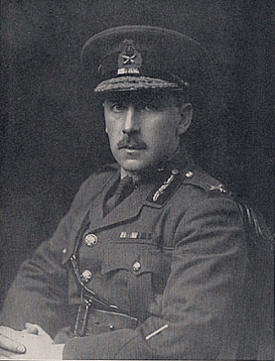Guy Livingston (British Army officer) facts for kids
Quick facts for kids
Guy Livingston
|
|
|---|---|

Brigadier-General Livingston in Army uniform
|
|
| Born | 17 July 1881 |
| Died | 10 May 1950 (aged 68) Southwick, Sussex, England |
| Allegiance | United Kingdom |
| Service/ |
British Army (1900–18) Royal Air Force (1918–19) |
| Years of service | c.1900–19 |
| Rank | Brigadier-General |
| Battles/wars | Second Boer War First World War |
| Awards | Companion of the Order of St Michael and St George Commander of the Order of the Crown of Italy Order of Saint Stanislaus, 2nd Class (Russia) |
Brigadier-General Guy Livingston (born July 17, 1881 – died May 10, 1950) was an important officer in the British Army and later the Royal Air Force (RAF) during the early 1900s. He played a key role in the First World War, especially with the early air forces.
Contents
Guy Livingston: A Military Leader
Guy Livingston began his military career around 1900, joining the British Army. He served in the Second Boer War, a conflict that took place in South Africa. This early experience helped shape his path as a military officer.
His Role in World War I
During the First World War, Guy Livingston became one of the few generals in the Royal Flying Corps (RFC). The RFC was the air force of the British Army before the Royal Air Force was created. He held important positions, like being the Chief Staff Officer at the RFC's Training Division. This meant he helped organize and manage the training of pilots and aircrew. Later, he became the Director of Air Organisation, helping to set up how the air force worked.
The Birth of the Royal Air Force
On April 1, 1918, a big change happened: the Royal Air Force (RAF) was officially formed. This new branch of the military combined the air forces of both the Army and the Navy. Guy Livingston was given a very important job in the new RAF. He was appointed Deputy Master-General of Personnel at the Air Ministry. In this role, he helped manage all the people working in the new air force. He stayed in this position until late November 1918.
After the War
After his military career, Guy Livingston wrote a book about his experiences. His autobiography, titled Hot Air in Cold Blood, was published in 1933. It shared his stories and insights from his time in the military.

